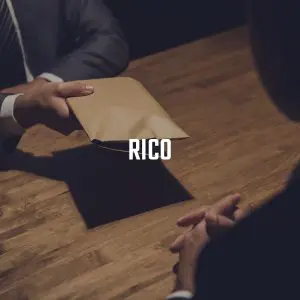 When the average person hears to words “RICO charges” they envision federal law enforcement agencies trying to take down the mafia kingpins from decades past. Today, however, the RICO (Racketeer Influenced and Corrupt Organization) Act is a powerful tool used by federal law enforcement agencies and prosecutors to combat not just organized crime, but drug trafficking, gang activity, and a variety of other crimes as well.
When the average person hears to words “RICO charges” they envision federal law enforcement agencies trying to take down the mafia kingpins from decades past. Today, however, the RICO (Racketeer Influenced and Corrupt Organization) Act is a powerful tool used by federal law enforcement agencies and prosecutors to combat not just organized crime, but drug trafficking, gang activity, and a variety of other crimes as well.
As the target of a federal RICO investigation or prosecution, you need an experienced federal RICO defense attorney on your side immediately to ensure that your rights are protected. At Haas Law, we have the resources and experience needed to defend you and your future if you are involved in a federal RICO case.
What Is the Racketeer Influenced and Corrupt Organization (RICO) Act?
Passed in 1970, the RICO Act was originally intended to be used by the federal government to combat organized crime in the United States. Since that time, RICO has been used to combat organized crime; however, the reach of RICO has expanded considerably in the intervening decades and is now a powerful and expansive weapon used by the federal government against individuals and businesses.
According to the U.S. Department of Justice, to be convicted of a RICO violation the prosecution must prove each of the following elements beyond a reasonable doubt:
- That an enterprise existed.
- That the enterprise affected interstate commerce.
- That the defendant was associated with or employed by the enterprise.
- That the defendant engaged in a pattern of racketeering activity.
- That the defendant conducted or participated in the conduct of the enterprise through that pattern of racketeering activity through the commission of at least two acts of racketeering activity.
What Is Racketeering?
To successfully, prosecute a violation of the RICO statute the federal government must prove “racketeering” activity. The definition of racketeering activity in the statute is lengthy and complex. In broad terms, however, “racketeering activity” involves any of the following:
- Acquiring a business through criminal activity (such as extortion)
- Using illegally obtained money to run a legitimate business (think money laundering)
- Using illegally obtained money to run a criminal enterprise (such as drug trafficking)
- Using a business as a front for a criminal operation (such as a “massage” parlor that is a front for a sex trafficking operation)
The RICO Act specifically includes 35 different criminal offenses that may constitute racketeering, including bribery, money laundering, fraud, and other “white collar” crimes as well as murder, drug trafficking, sex and human trafficking, and kidnapping.
What Are the Penalties for a RICO Conviction?
Federal prosecutors frequently use the RICO Act as a tool by adding a RICO Act violation to underlying charges. In a federal weapons or drug trafficking case, for instance, a RICO violation might be added to put pressure on the defendants given the potential penalties a RICO violation carries if convicted.
A RICO Act conviction alone carries up to 20 years in prison and/or a fine of up to $250,000 or twice the proceeds of the offense. Conviction of a RICO violation can even result in life in prison if certain crimes (such as murder) were involved in the racketeering activity. A business or organization faces even higher potential fines. A RICO conviction often results in forfeiture of property and/or money obtained using proceeds of the crime and victims can pursue restitution in civil court for three times the damages.
Are There Defenses to Allegations of a RICO Violation?
As the target of a RICO investigation or defendant in a RICO prosecution, you should take the investigation/prosecution seriously given the broad reach of RICO and the harsh penalties imposed for a conviction. The good news, however, is that the complex nature of the RICO Act frequently allows an experienced federal RICO defense attorney to mount a strong and successful defense. Common defense strategies in a federal RICO case include:
- No pattern of criminal activity. The prosecution must prove a pattern of racketeering activity by proving at least two qualifying acts. Your attorney may focus on the absence of a pattern if one (or both) acts are questionable.
- Illegal search and seizure. RICO cases almost always involve a search and seizure by law enforcement. If anything about the search and seizure was not legal (lack of probable cause, search outside the scope of the warrant, technical errors on the warrant), any evidence seized during the search may be inadmissible at trial.
- Focusing on the “criminal enterprise” (or lack thereof). Any racketeering activity must be associated with an enterprise or organization for it to be a violation of RICO. When the government has little evidence relating to the alleged “enterprise,” casting doubt on the existence of that enterprise can be an excellent defense strategy.
- Raising doubt about the money trail. Money is almost always involved in a RICO prosecution. Following the money trail can be challenging, even for federal law enforcement agencies. Your attorney may focus on the government’s failure to prove a relationship between illegally obtained money and racketeering activities.
Get Help from an Experienced Federal RICO Defense Attorney
If you believe you are part of a federal RICO investigation or have formally been charged in a RICO case, do not wait to speak to a federal criminal defense attorney at Haas Law. Our experienced federal RICO defense attorneys understand the complex nature of a RICO investigation or prosecution, and we have the experience, resources, and dedication necessary to protect you, your rights, and your future.
Call us at 407-755-7675, chat with us online, or submit our online form today. Because we understand that time is of the essence when federal law enforcement authorities are investigating you, our calls are answered 24 hours a day, allowing you to schedule an appointment as soon as possible to discuss your legal options.
